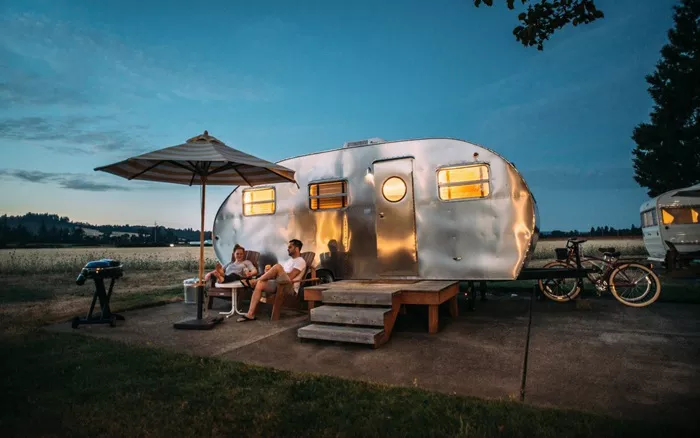Camping is a wonderful way to connect with nature, enjoy outdoor activities, and create lasting memories. But choosing the right time to go camping can make a big difference in your experience. This guide will help you determine when to go camping by considering various factors such as weather, location, and personal preferences.
Understanding Seasons
Each season offers a unique camping experience. Here’s a breakdown of what to expect in each season.
Spring Camping
Weather and Environment: Spring is a beautiful time for camping. The weather starts to warm up, and flowers begin to bloom. However, it can also be unpredictable. Be prepared for rain and cooler temperatures at night.
Activities: Spring is great for hiking and bird watching. Many animals are active as they come out of hibernation. It’s also a perfect time for wildflower viewing.
Considerations:
- Location: Choose areas with good drainage to avoid muddy sites.
- Packing: Bring waterproof gear and layers for varying temperatures.
Summer Camping
Weather and Environment: Summer is peak camping season. Expect warm temperatures and longer days. However, some regions may experience extreme heat, especially in desert areas.
Activities: Summer offers the best opportunities for swimming, fishing, and hiking. Many campgrounds host events and activities during this time.
Considerations:
- Location: Popular campgrounds can get crowded. Consider less-known sites for solitude.
- Packing: Bring plenty of water, sunscreen, and bug spray.
Fall Camping
Weather and Environment: Fall is a favorite among many campers. The temperatures are cooler, and the fall foliage provides stunning views. Days are still warm, but nights can get chilly.
Activities: Enjoy hiking, photography, and camping under the stars. Fall is also the time for harvest festivals in many regions.
Considerations:
- Location: Higher elevations may get cold quickly. Check for early snow.
- Packing: Bring warm clothes and layers. A good sleeping bag is essential.
Winter Camping
Weather and Environment: Winter camping can be a unique experience. The landscape is often serene and beautiful, but it requires special preparations. Temperatures can drop significantly, and snow may be present.
Activities: Winter sports such as skiing, snowshoeing, and ice fishing are popular. Many enjoy the quiet beauty of winter landscapes.
Considerations:
- Location: Look for campgrounds that allow winter camping and have amenities.
- Packing: Bring insulated gear, snowshoes, and a winter tent.
Choosing Your Destination
The location you choose also impacts when to go camping. Different regions have different climates and peak seasons.
National Parks
Best Time to Visit: Most national parks are best visited in late spring and early fall. Summer can be crowded.
Considerations:
- Crowds: Expect larger crowds in summer.
- Reservations: Many parks require reservations, especially during peak times.
Lakes and Beaches
Best Time to Visit: Summer is ideal for lake and beach camping. Warm weather allows for swimming and other water activities.
Considerations:
- Weather: Check for local weather patterns. Some areas may have storms.
- Amenities: Look for campgrounds with facilities like showers.
Mountains and Forests
Best Time to Visit: Late spring to early fall is great for mountain camping. Be mindful of snow in early spring.
Considerations:
- Altitude: Higher elevations can have variable weather.
- Wildlife: Animals are more active in the spring and summer.
Weather Conditions
Weather is a crucial factor in deciding when to go camping. Here are some considerations:
Rain and Storms
Planning for Rain: If you camp in spring or summer, be prepared for rain. Check the forecast before your trip.
Campsite Selection: Choose elevated sites with good drainage to avoid flooding.
Temperature Extremes
Heat: In summer, avoid camping during heatwaves. Seek shady spots and stay hydrated.
Cold: In fall and winter, ensure you have proper insulation and warm gear. Check weather forecasts for frost or snow.
Personal Preferences and Schedules
Your schedule and preferences will also affect when you can camp.
Work and Family Schedules
Finding Time: Look for long weekends or holidays. These times are often more convenient for families.
Outdoor Activities
Hiking, Fishing, and More: Consider the activities you enjoy. Some require specific seasons. For example, fishing is often best in spring and fall.
Special Events and Festivals
Many areas host outdoor festivals and events throughout the year. These can enhance your camping experience.
Music Festivals
Timing: Summer is prime for music festivals. Many campgrounds offer nearby camping.
Harvest Festivals
Timing: Fall is the season for harvest festivals. They often feature local food and activities.
Safety Considerations
Safety should always be a priority when planning your camping trip.
Wildlife Awareness
Encounters: Be aware of wildlife in the area. Certain seasons may have more animal activity, particularly during mating or feeding times.
Trail Conditions
Preparation: Check trail conditions and any advisories before heading out. Some trails may be closed due to weather.
Conclusion
Choosing when to go camping involves considering the seasons, location, weather, personal preferences, and safety. Each season offers unique experiences, so think about what you want from your trip.
Final Tips:
- Always check the weather forecast before your trip.
- Pack according to the season and activities.
- Be flexible with your plans to make the most of your camping experience.
With careful planning, you can enjoy the great outdoors and create wonderful memories. Happy camping!
Related topics:
- Top 5 Multi-Fuel Camping Stoves
- Best Freeze-Dried Camping Meals
- The Best Winter Sleeping Bags: Guide to Staying Warm and Comfortable

